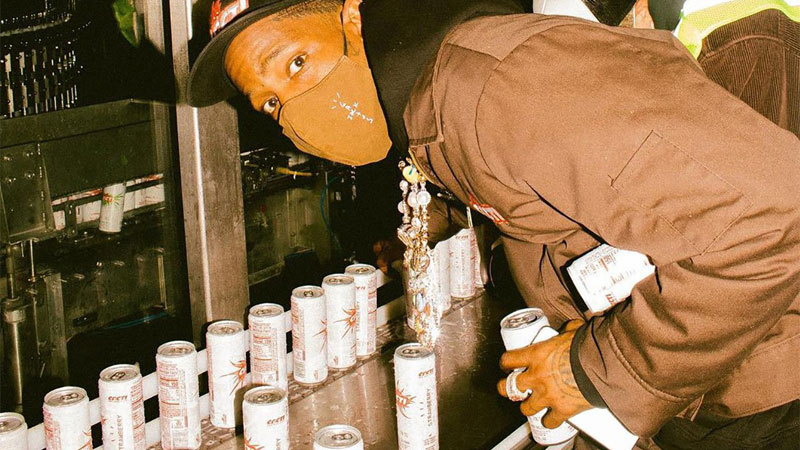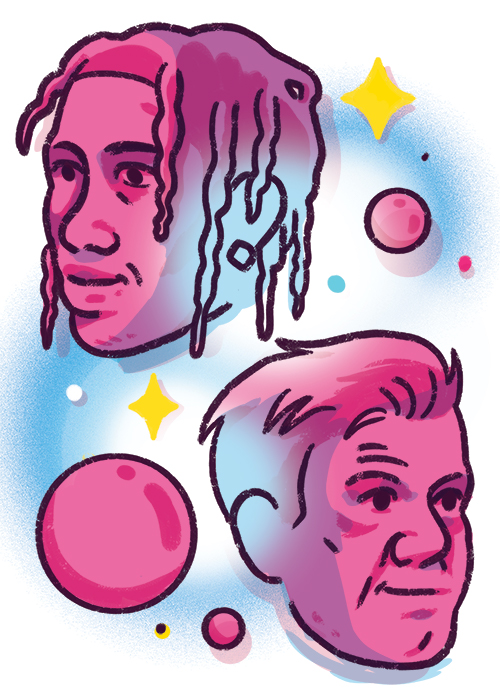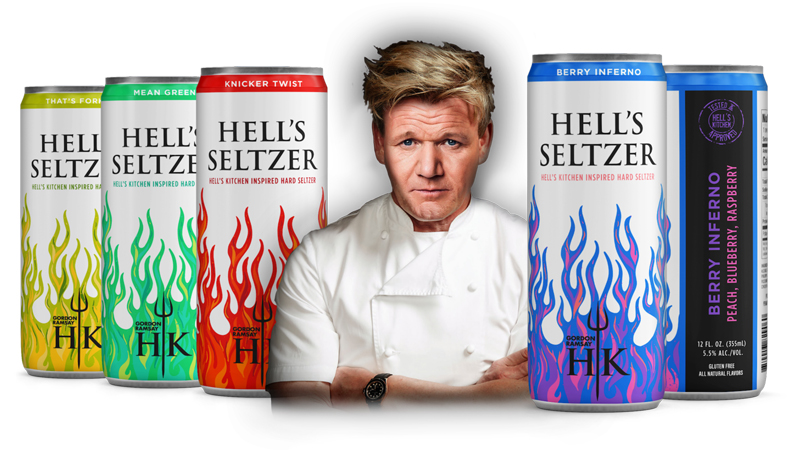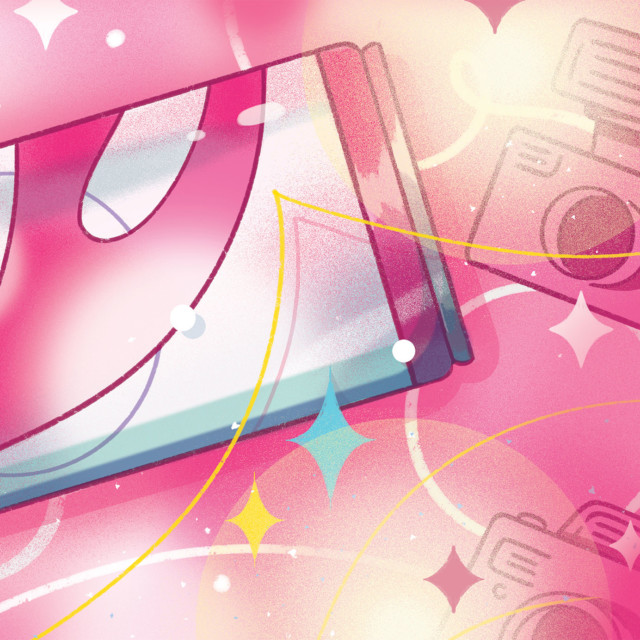Anheuser-Busch’s Los Angeles brewery opened in 1954, the tip of the spear in the St. Louis lager king’s post-war expansion westward. Back then, this sprawling facility in Van Nuys was a model of mid-century corporate self-celebration, boasting a theme park, a suspended monorail, and an exotic bird sanctuary. That’s all gone now, victims of changing time and taste. But the plant remains, and on a winter day in early 2021, there was a much more glamorous, and entirely contemporary attraction on location: Travis Scott.
The 28-year-old rapper-turned-rising Midas of American consumerism touched down in mid-February, shining A-list star power on the workaday plant, posing for photo ops and grabbing cans off the whirring line as rank-and-file A-B production workers cheered.
“We out in CACTI Headquarters,” said Scott, emerging from a modified, debadged sedan. You can see the plant’s swoopy, cursive “Budweiser” signage in the background, plus conspicuously placed decals heralding the business at hand. “This is one of my locations.”
Roll your eyes at your own peril. The building is still Budweiser’s, but it’s Scott who’s about to claim some coveted space in the multinational conglomerate’s portfolio. CACTI, Scott’s agave-infused hard seltzer line produced in partnership with A-B, hits shelves nationwide on March 15. He was there to sample the product — and, crucially, to get his social media followers hyped for its coming release.
“I’m tellin’ you man, best of the best right there,” he told CACTI’s 500,000 Instagram followers. (His own Instagram account, where he’s been teasing the brand for months, boasts another 37.7 million.)
As both an established international headliner and “corporate America’s brand whisperer,” Scott’s imminent entrance to the hard seltzer space is just the latest reminder that the white-hot category White Claw built is nothing like its fellow fermentable, beer.
Can you imagine an A-lister like Scott lending the full weight of their stardom to the launch of a nationally distributed, collaboratively branded beer line? Spirits, sure. Wine, maybe. But beer? Beer is boring, mature, and losing share. Hard seltzer is new, appealing, and rising faster than the bubbles that make it so delightfully effervescent. As one celebrity licensing veteran told VinePair, the flavored malt-beverage category leader is one of “the hottest new areas for celebrities,” much more akin to liquor than lager.
Here’s why Big Bubbly is primed to leapfrog beer among big-name backers and follow in the spirits category’s grand tradition of celebrity-leveraged lucre in ways your IPA could never.

‘It’s really hot right now’
Start with the basic seltzer-celebrity synergy: A-list celebrities are young, sexy, and popular almost by definition, and hard seltzers, while imbibed inter-generationally, are particularly popular among younger drinkers.
According to a June 2020 report from NielsenIQ, a full 70 percent of millennials think of the beverage as their own category entirely, despite the fact that it’s produced on the same equipment and with the same fundamental processes as beer. Two months later, when polling firm YouGov asked 2,800 millennial drinkers which brands they’d bought in the past 30 days, White Claw ranked third behind only Bud Light and Corona.
And while market researchers would scoff at the methodology, an audit of the dumpster outside pretty much any fraternity or sorority house in America right now would likely tell the same story: America’s youngest, trendiest drinkers are drinking hard seltzer by the case.
With so many young drinkers all in on hard seltzer, it only stands to reason that celebrities would look to this product category for potential partnerships — it’s a match made in branding heaven. Thus, CACTI is not alone: Scott, who’s already notched big-time partnerships with McDonald’s and PlayStation, has company from pop-country hunk Luke Bryan, and mega-chef Gordon Ramsay, both of whom will release hard seltzer products this year. (Shay Mitchell, a Canadian actor known for her star turn in “Pretty Little Liars,” also recently rolled out a sparkling canned tequila, which is not quite the same thing but still merits mention.) One imagines other celebrities hoping to score some of the $4.1 billion American drinkers spent on hard seltzers last year will soon do likewise.
“The two hottest new areas for celebrities are hard seltzer slash the spirits realm, and cannabis,” said Doug Shabelman, CEO of Burns Entertainment, a marketing firm that specializes in celebrity licensing partnerships. (Burns Entertainment has beverage industry clients, including Corona; it does not work with any of the celebrities or brands mentioned in this story.) “There’s just a newness to it … designed and aimed at a younger audience, so it’s a natural place for celebrities to be included,” Shabelman said.
“It’s really hot right now,” agreed Jeffrey Kobulnick, partner at Brutzkus Gubner Rozansky Seror Weber and chair of the firm’s intellectual property practice, who has worked on beverage industry licensing deals in the past. While licensing alcohol products can be touchy for celebrities if their audiences are young or they’re popular in communities where drinking is frowned upon, Kobulnick speculated that “celebrities are probably more inclined to put their name on a product like hard seltzer because it has more of a health-conscious aspect to it.”
“I’d think the target demographic … is probably a wider age range than people that are buying specific distilled spirits, or beer,” he continued, “so there’s an opportunity that celebrities recognize there.”

‘Not difficult or aspirational’
Of course, celebrity licensing is nothing new in the beverage alcohol business, but while there’s a long and colorful track record of famous folks launching liquor brands (and, to some extent, wine), America’s celebrities have struggled to translate their big names into beer sales. From Motorhead and Metallica to Adrien Grenier and the Hanson brothers, famous forays in the brewing business have delivered mostly middling outcomes.
But despite being compositionally alike, these fame-beer flops may actually augur well for hard seltzer. Consider: “Beer tends to be about authenticity and ingredients,” Steven Grasse, a beverage industry vet responsible for branding (and rebranding) coups like Hendrick’s gin, Sailor Jerry’s rum, and Narragansett beer, told writer Tara Nurin in her 2019 piece on the subject for VinePair. “Having it be endorsed by Kanye or Kim Kardashian wouldn’t really help your case, it would probably hurt you.”
On the flip side, hard seltzer is held to no such standards on provenance and substance. Craft brewing emerged as a category skeptical of dilettantism, reverent of tradition, and combative to commodity; hard seltzer is none of those things, and people love it. The Atlantic’s Amanda Mull pointed out in her own 2019 piece on White Claw’s rise that “A major factor in hard seltzer’s current popularity is what it’s not: difficult or aspirational.” It’s a cipher, an empty vessel, whatever you need it to be.
At some point in the future, we may see mainstream drinkers care about their hard seltzers being organic (looking at you, Michelob Ultra line extension), or made with real-fruit adjuncts and hop varietals, as VinePair’s own Tim McKirdy contemplated in his 2021 craft hard seltzer forecast. But for now, White Claw and Truly combine for around 75 percent of this category in the U.S., and no one drinking those brands is geeking out about how the liquids were brewed. Hard seltzer has no artisanal patina, and requires no knowledge of the average drinker besides how to open a can. It just kind of… exists.
“The consumer just does not see the ‘craftiness’ in [hard] seltzer that they see in hazy IPA,” said Steve Kwapil, CEO and cofounder at Brew Pipeline, the Milwaukee-area firm that brokered the deal between Ramsay’s company and City Brewery, a contract brewing heavy slated to produce the liquid. In other words, the same thing that puts small brewers at a disadvantage when trying to carve into the category’s craft side positions celebrity-backed mass-produced hard seltzers for success. Of course the stuff has to be palatable, but the success of, say, Hell’s Seltzer’s Knicker Twist (which is a real, if distressingly named, flavor in the brand’s lineup) will ride on Ramsay’s appeal to drinkers. If it’s made with quality ingredients, as Kwapil promises it will be, that’s a cherry — or in Hell’s Seltzer brand parlance, the Berry Inferno — on top.
Licensing and partnerships and endorsements — oh my!
If you’ve watched television once in the past half-century, you’ve seen celebrities promoting beer brands. Lately, they’re doing the same for hard seltzer brands, too. But there’s a difference between, say, Don Cheadle shilling Mich Ultra’s new organic seltzer in a Super Bowl ad, Ramsay slapping his familiar sneering visage on a white-labeled FMB line, and Scott launching a beverage company in collaboration with the world’s biggest brewer.
One is an endorsement, another a licensing deal, and the other, something closer to a joint-venture or partnership.
In beer, celebrities often go the endorsement route — money for appearance, a cut-and-dried deal. “If you do a typical endorsement, I’m going to pay you X, you’re going to perform in the commercials and do work for us, but there is no royalty,” explained Burns Entertainment’s Shabelman. “There’s no aspect of getting paid [according to] how well the brand can do.”
What we’re seeing in the hard seltzer space is different, more aligned with spirits than beer or wine. These are licensing deals that put celebrities’ names and likenesses on new products, or true business partnerships in which the stars are taking equity positions in the joint venture. Ramsay’s deal appears to be the former; Scott’s the latter. (Neither celebrity responded to VinePair’s requests for an interview for this story.) A-B’s vice president of marketing for “Beyond Beer,” Lana Buchanan, declined to offer specifics on the company’s arrangement with the rapper, but told VinePair in emailed remarks that it was “more than a typical celebrity brand deal.”
Regardless of the structure, both types of deals reflect producers’ desire to create new product lines and intellectual property in the hard seltzer category — and to do it with partners who already command massive audiences.
“Right now, companies are looking to create new brands … and a lot of these celebrities are becoming brands themselves,” said Shabelman. “When [producers] are looking to license in this space, whether it’s spirits or hard seltzers, they are going to want to find somebody who has a 360-degree platform.” This type of deal ups the ante for both the producer and the celeb involved, and as a new, still developing product category, the stakes are particularly high for licensing deals in the hard seltzer space. Like tequila, this is a consumable good judged by its flavors and clarity. But unlike tequila, for which production standards are regulated and taste profiles established, hard seltzer has little by way of benchmarking.
“When you have something that humans are putting into their body, then you do have a little bit more concern about the quality not being” acceptable, said Kobulnick. “I’m not saying that celebrities want their name on cheap stuff — they don’t. But there is a little bit of a higher expectation with an alcoholic beverage like hard seltzer, that it is really going to be a higher-quality product, and that [their] brand is going to come out stronger as a result of being used with it.”
In other words, while hard seltzer may be a figuratively empty vessel, the literal liquid inside the can matters not just to drinkers, but to celebrities looking to make moves in the space. If Scott’s CACTI is undrinkable, no amount of star power will save the brand from retail ruin, and such a failure would reflect poorly on Scott himself.

‘A new, blank product’
Calling hard seltzer an empty vessel may sound like an insult to the average hard seltzer hardo. But to celebrity branding experts, it sounds like opportunity. “It’s just like creating a new, blank product,” said Shabelman excitedly. “It’s literally just a commodity … so what talent is going to lend to it is that big story.”
Therein lies the strength of hard seltzer’s branding potential. Everyone feels great about it, to the extent that anybody feels anything about it. The category carries none of beer’s blue-collar and bro-oriented cultural baggage, none of wine’s class-and-gender bullsh*t, and none of spirits’ darker alcoholic shades. We have no shared cultural nostalgia for fetching a Truly Wild Berry from the fridge for Pop-Pop after a long day at the factory, because that never happened. That leaves the category wide open to be co-opted by celebrities with stories to tell and 12-packs to sell to their massive audiences.
That’s certainly what Hell’s Seltzer is banking on. “Very few brands have the ability to go national [but] there are certain people or organizations that can make a brand relevant nationally,” said Kwapil. “So taking someone like Gordon Ramsay [from] Hell’s Kitchen, who’s all about freshness and flavors, that really resonates.”
“The response from the distributors has been, ‘hell, yeah,’” he added.
But will rank-and-file drinkers give celebrity hard seltzers the same enthusiastic affirmative? It seems likely: Undeniably popular, unprecedented in the canon, and alienated from the labor and raw material by which it was produced, hard seltzer is an optimal fulcrum for mainstream fame.
Which brings us back to Travis Scott. As the highest-profile celebrity play in the category, CACTI will be the biggest test of the hypothesis yet. If it succeeds (and, frankly, even if it doesn’t) expect more to flow forth, both from competitors and A-B’s own breweries. “This partnership with Travis is allowing us to challenge the status quo and develop our brand-building capabilities of the future as we focus on our Beyond Beer portfolio,” said Buchanan.
The statement is a good reminder that the whole point of celebrity licensing in the hard seltzer space is to sell more cases of hard seltzer. Thinking about it in those terms, hard seltzer’s licensing potential hardly seems glamorous. But then again, that’s what the famous people are for.
This story is a part of VP Pro, our free platform and newsletter for drinks industry professionals, covering wine, beer, liquor, and beyond. Sign up for VP Pro now!
